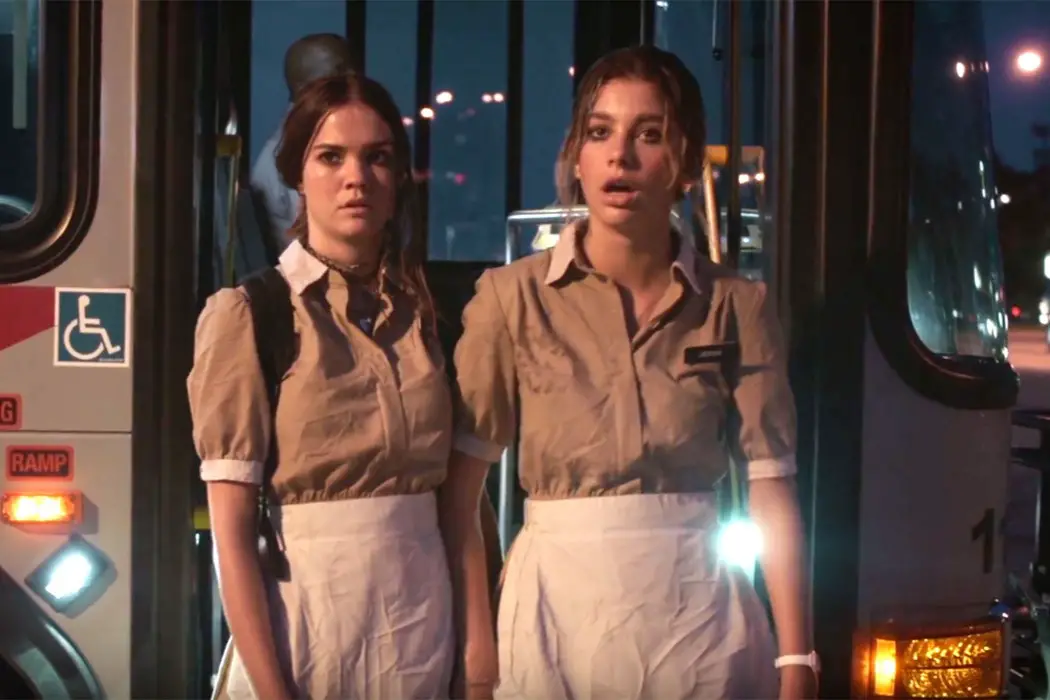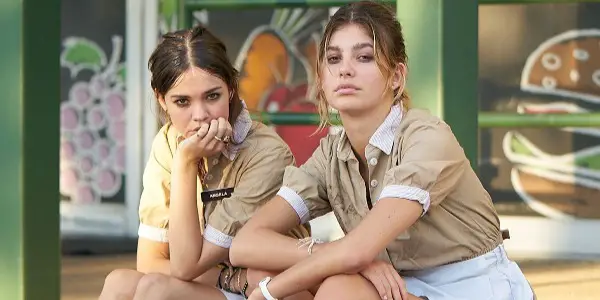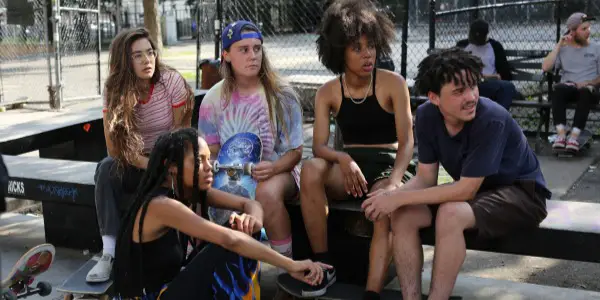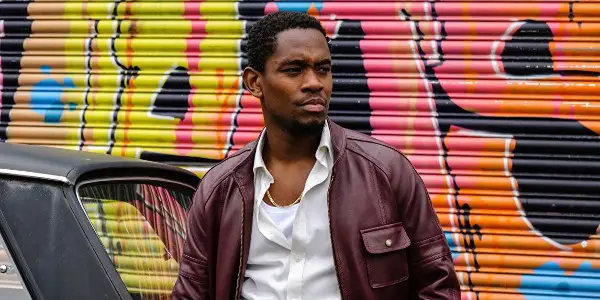Sundance London 2018: NEVER GOIN’ BACK, SKATE KITCHEN & YARDIE

Alistair is a 25 year old writer based in Cambridge.…
For those in the British isles who can’t make the January pilgrimage to Utah, the Sundance London festival is one of the key dates in the cinephile calendar. For three days, the most acclaimed films from the 2018 festival debut in the UK – and, for many of these films, the festival represents the only time they will be seen by cinema audiences in the country.
This year’s lineup includes the likes of Ari Aster’s acclaimed debut Hereditary and Debra Granik’s long awaited Winter’s Bone follow-up Leave No Trace, both of which will be reviewed in full later this week. In addition to this, Eighth Grade, First Reformed and The Miseducation of Cameron Post will also be making their British bows; but considering our team of writers have extensively covered these three titles at other festivals, I’m deciding not to cover the same ground here.
First, it’s time to shine a light on the films playing the festival that have arrived with less fanfare; the films that charmed Sundance audiences enough to make the trip across the Atlantic, while not capturing as many headlines as the aforementioned efforts. Are these films deserving of the “Sundance hype” that eludes them?
Never Goin’ Back (Augustine Frizzell)
The feature debut of Augustine Frizzell is pitched somewhere between the social realist economic anxieties of The Florida Project and the lowbrow gross-out humour of the Harold and Kumar movies. Despite the socio-economic backdrop, and the trap heavy soundtrack that places the film within the current cultural moment, Frizzell’s film can’t help but feel dated, overly reliant on cliched comedic concepts and played-out scatological set-pieces as opposed to any fresh ideas.
On paper, this should feel like a film of its time, placing its anti-heroines in a screwball scenario that is only slightly heightened from the financial realities of many millennials – and yet the lack of comedic surprises, and the constant return to the lowest common denominator gags, makes it feel like a hangover from the Porky’s era.
Jessie (Camila Morrone) and Angela (Maia Mitchell) are an inseparable young couple who have dropped out of high school and earn money working at a nearby diner. Rent is due in a week’s time, but the pair have blown it all on a birthday getaway to Galveston and need to work multiple shifts that week to afford both. Unfortunately, they have to contend with an older brother who gets into drug dealing, leading to their house being robbed, which in turn leads to them getting thrown in jail for drug possession.
Upon their release two days later, the desperation to make the money back increases, and under a marijuana fueled haze, come up with a number of get rich quick schemes that, by one way or another, fail spectacularly.

There’s nothing wrong with the simplistic concept, or the lowbrow sense of humour, in theory. It’s the execution where the film falters spectacularly; gross-out jokes are signposted from a mile away, to the extent that an early character detail might as well be labelled “Chekhov’s Constipation”, with the entire story forcing itself into elaborate directions purely to accommodate visual gags you’ve seen a million times before.
For a stoner comedy, you’d also expect the film to rely less on the most basic drug humour imaginable to please its target audience – the “character accidentally ingests marijuana-infused food” gag, which here stretches on for ten of the film’s seemingly never-ending 85 minutes, is a trope that should have been put to rest in the Cheech and Chong era.
Frizzell also manages the unfortunate feat of making one of the few films that, despite being helmed by a female director, is cursed with an unfortunate male gaze. Her central characters (who are aged 16 and 17, it should be noted) are always portrayed with the camera lingering on their bodies when wearing little more than their underwear, with one character significantly older than the pair constantly making inappropriate sexual advances the film finds funny due to his charmlessness, never asking us to be disturbed that he’s sexualising girls under the age of consent.
The pair drink, take drugs and swear like troopers, but despite the age of the actors playing them, are still technically children. There’s something irresponsible about the handling of this – and the film just seems indifferent to properly address this, lest it get in the way of the laughs.
Although the lack of moralising within Never Goin’ Back is refreshing for an American comedy, this isn’t a film that offers a cynical social commentary in its place. This is a stoner comedy with mainstream aspirations, leaving its more questionable moments feeling all the more jarring – and making sure that I was never laughing due to how uncomfortable the entire film made me, regardless of the familiarity of every single joke told.
Skate Kitchen (Crystelle Moselle)
For a teen movie that feels fresh, and features an abundance of charm, look no further than Skate Kitchen. The feature debut of documentarian Crystelle Moselle, her film feels like the first teen movie of the Instagram era that feels genuinely timeless. Moselle uses the skating sub-culture as a jumping off point to explore the various different cliques that exist parallel to this world, offering a realistic look at metropolitan teen life in the 21st Century, that will remain fresh even when the social media app featured extensively within the storyline has faded into irrelevancy.
Rachelle Vinberg plays Camille, a teen from Long Island who we are introduced to in a moment of borderline Cronenbergian body horror; skating at her local park, she has a bloody incident that leads her mother to ban her from skateboarding. Around the same time, she discovers a collective in New York known as the “Skate Kitchen” – a group of girls around her own age who share videos of their skating stunts on Instagram.
She heads over to the city and easily integrates into the group, a development that leads her to become estranged from her mother, and is further complicated by a blossoming friendship with the photographer from a rival crew (Jaden Smith).

Skate Kitchen can easily be described as a humanist Harmony Korine film; there’s the same X-rated adolescent behaviour as Kids, only contrasting that film’s downbeat pessimism with an infectious sense of community among the disparate social groups, where sensitive young adults co-exist with their more abrasive counterparts. This is managed while parental responsibility is largely absent from the story.
Camille has run away from home, and many of the characters seem to live their existences entirely in skate parks and house parties, with no desire to chase the same adult responsibilities as their peers in the business oriented cityscape they skate through. That these characters have, for the most part, maintained an emotional maturity makes this utterly refreshing; there’s no sensationalising for the sake of it, with all the later conflicts occurring in the most naturalistic manner possible, not tied to any deeper societal rifts.
In the lead role, Rachelle Vinberg is nothing less than a revelation. The film’s opening 20 minutes, when it takes on an unassuming, mumble-core style, are a masterclass in underacting – barely managing to hide the disenfranchisement with her home life, and displaying a realistic social awkwardness when integrating into the skate kitchen for the first time.
When she opens up about her tortured childhood and miserable family life to her new friends, Vinberg does so with a restraint unheard of for an actor making their feature film debut. The scene is all the more powerful because Moselle’s Verite style is perfectly complimented by this deceptively subtle performance, with the emotional confession feeling more tangible than anything in her previous effort, 2015 documentary The Wolfpack.
Skate Kitchen is the sort of film that gets overlooked on the festival circuit. When everybody’s searching for the next big cinematic sensation, a low-key charmer like this falls under the radar by default. It shouldn’t – it’s a welcome addition to the contemporary coming of age canon, and is the rare teen film depicting the modern era that feels like it will continue its charm offensive on generations of teen viewers to come.
Yardie (Idris Elba)
Idris Elba is one of the most charismatic actors currently working – a man who has the unique feat of maintaining an iconic presence, even when his big screen roles consistently underserve his talents. His personality can be keenly felt in every frame of Yardie, a confident directorial debut that plays around with the conventions of the crime drama with an earnest affection; one moment he’s toying with overused cliches, the next he’s wholeheartedly embracing them.
It’s undeniably a flawed film due to the unfocused screenplay (co-written by Brock Norman Brock and Martin Stellman) that can’t quite settle on an effective tone for the story to follow – although Elba at least translates this to the screen with a polish that softens the blow of the inherent storytelling problems.
Adapted from Victor Headley’s cult early nineties novel, Yardie follows D (Aml Ameen), a Jamaican man with a troubled past; his brother was shot to death in front of him, at a peace concert he organised to stop the fighting between rival gangs that caused extensive bloodshed. Years later, he’s asked to go to London for a simple delivery job, by the former leader of one the gangs, who’s now an established music producer.

Arriving in the British capital, his drug connection, Rico (Stephen Graham) proves to be unhinged, so he flees with the product and intensifies a situation between rival gangs. To make things worse, he unexpectedly finds himself reunited with his wife and young daughter, who get caught up in the mess as a by-product of his actions.
Yardie isn’t quite the disaster many critics have made it out to be. It has an ever so slightly off beat charm that makes it feel slightly unusual when compared to similar crime dramas about a drug dealing underworld. Elba isn’t afraid to lighten the foreboding tone with a blast of comedy, and the film’s menacing villain is one of the more unusual screen characters in a film of this genre for quite some time. Played by Stephen Graham, the performance is likely inspired by Gary Oldman’s turn in True Romance – and yet, seeing him frequently lapse between a hardened London accent and a Rastafarian twang that’s oddly unsettling gives the film a distinct rhythm all of its own.
These characterful peculiarities help make the film so beguiling, earning it goodwill that it only goes on to squander via a convoluted (not to mention overly familiar) narrative, and a reliance on every cliche under the sun. There is more than one instance of a character falling to their knees and screaming “NO!” to the heavens, which should tell you everything you need to know about the film’s issues.
Overall, the familiar elements of Yardie outweigh the delightfully offbeat ones, leaving the final product feeling fairly forgettable – but with glimmers of hope that Elba can pull it together for a far more accomplished sophomore directorial effort. After all, he’s managed to make a confused screenplay into a sporadically entertaining thriller. Imagine what he could do with a polished script.
Does content like this matter to you?
Become a Member and support film journalism. Unlock access to all of Film Inquiry`s great articles. Join a community of like-minded readers who are passionate about cinema - get access to our private members Network, give back to independent filmmakers, and more.
Alistair is a 25 year old writer based in Cambridge. He has been writing about film since the start of 2014, and in addition to Film Inquiry, regularly contributes to Gay Essential and The Digital Fix, with additional bylines in Film Stories, the BFI and Vague Visages. Because of his work for Film Inquiry, he is a recognised member of GALECA, the Gay & Lesbian Entertainment Critics' Association.













